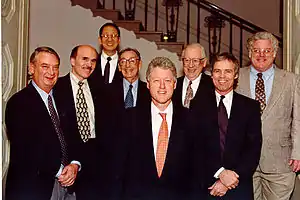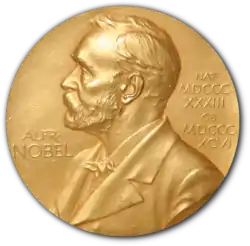Robert B. Laughlin
Robert Betts Laughlin (born November 1, 1950) is the Anne T. and Robert M. Bass Professor of Physics and Applied Physics at Stanford University.[1] Along with Horst L. Störmer of Columbia University and Daniel C. Tsui of Princeton University, he was awarded a share of the 1998 Nobel Prize in physics for their explanation of the fractional quantum Hall effect.
Robert Betts Laughlin | |
|---|---|
 | |
| Born | November 1, 1950 Visalia, California, United States |
| Nationality | United States |
| Alma mater | MIT University of California, Berkeley |
| Known for | Quantum Hall effect |
| Awards | E. O. Lawrence Award (1984) Oliver E. Buckley Condensed Matter Prize (1986) Nobel Prize in physics (1998) The Franklin Medal (1998) |
| Scientific career | |
| Fields | Theoretical physics |
| Institutions | Stanford |
| Doctoral advisor | John D. Joannopoulos |
In 1983, Laughlin was first to provide a many body wave function, now known as the Laughlin wavefunction, for the fractional quantum hall effect, which was able to correctly explain the fractionalized charge observed in experiments. This state has since been interpreted as the integer quantum Hall effect of the composite fermion.[2]
Biography
Laughlin was born in Visalia, California. He earned a B.A. in mathematics at the University of California, Berkeley in 1972, and his Ph.D. in physics in 1979 at the Massachusetts Institute of Technology (MIT). Between 2004 and 2006 [3] he served as the president of KAIST in Daejeon, South Korea.
View on climate change
Laughlin's view of climate change is that it may be important, but that the future is impossible to change.
The climactic/geologic recovery process
"On the scales of time relevant to itself, the earth doesn’t care about any of these governments or their legislation. It doesn’t care whether you turn off your air conditioner, refrigerator, and television set..The earth plans to dissolve the bulk of this carbon dioxide into its oceans in about a millennium, leaving the concentration in the atmosphere slightly higher than today’s. Over tens of millennia after that, or perhaps hundreds, it will then slowly transfer the excess carbon dioxide into its rocks, eventually returning levels in the sea and air to what they were before humans arrived on the scene. The process will take an eternity from the human perspective, but it will be only a brief instant of geologic time".
Any effort to slow the rate of fossil fuel usage
"leave the end result exactly the same: all the fossil fuel that used to be in the ground is now in the air, and none is left to burn"
The energy future
"The geologic record as we know it thus suggests that climate is a profoundly grander thing than energy. Energy procurement is a matter of engineering and keeping the lights on under circumstances that are likely to get more difficult as time progresses. Climate change, by contrast, is a matter of geologic time, something that the earth routinely does on its own without asking anyone’s permission or explaining itself... Far from being responsible for damaging the earth’s climate, civilization might not be able to forestall any of these terrible changes once the earth has decided to make them... The geologic record suggests that climate ought not to concern us too much when we’re gazing into the energy future, not because it’s unimportant, but because it’s beyond our power to control.."[4]
Honors and awards
- E. O. Lawrence Award in Physics – 1984
- Oliver E. Buckley Prize – 1986
- Elected Fellow of the American Physical Society - 1986
- National Academy of Sciences – 1994
- Benjamin Franklin Medal for Physics of the Franklin Institute – 1998
- Nobel Prize in Physics – 1998
- Golden Plate Award of the American Academy of Achievement – 1999[5]
- Doctorate of Letters, University of Maryland – 2005
- Onsager Medal – 2007
Publications

Laughlin published a book entitled A Different Universe: Reinventing Physics from the Bottom Down in 2005. The book argues for emergence as a replacement for reductionism, in addition to general commentary on hot-topic issues.
- Laughlin, Robert B. (2005). A Different Universe: Reinventing Physics from the Bottom Down. Basic Books. ISBN 978-0-465-03828-2. (Trad. esp.: Un universo diferente. La reinvención de la física en la Edad de la Emergencia, Buenos Aires/Madrid, Katz editores, 2007, ISBN 978-84-935432-9-7).
- Laughlin, Robert B. (2008). The Crime of Reason: And the Closing of the Scientific Mind. Basic Books. ISBN 978-0-465-00507-9. (Trad. esp.: Crímenes de la razón. El fin de la mentalidad científica, Buenos Aires/Madrid, Katz editores, 2010, ISBN 978-84-96859-68-5).
- Mente y materia. ¿Qué es la vida? Sobre la vigencia de Erwin Schrödinger (with Michael R. Hendrickson; Robert Pogue Harrison and Hans Ulrich Gumbrecht), Buenos Aires/Madrid, Katz editores, 2010, ISBN 978-84-92946-12-9.
- Laughlin, Robert B. (2013). Powering the Future: How We Will (Eventually) Solve the Energy Crisis and Fuel the Civilization of Tomorrow. Basic Books. ISBN 9780465022205.
References
- Robert Laughlin – Stanford Physics Faculty. Stanford.edu. Retrieved on 2012-01-28.
- J.K. Jain (1989). "Composite fermion approach for fractional quantum Hall effect". Physical Review Letters. 63 (2): 199–202. Bibcode:1989PhRvL..63..199J. doi:10.1103/PhysRevLett.63.199. PMID 10040805.
- http://www.koreafocus.or.kr/design2/layout/content_print.asp?group_id=101176
- "What the Earth Knows" – Robert B. Laughlin. The American Scholar. Retrieved on 2012-01-28.
- "Golden Plate Awardees of the American Academy of Achievement". www.achievement.org. American Academy of Achievement.
External links
 Media related to Robert B. Laughlin at Wikimedia Commons
Media related to Robert B. Laughlin at Wikimedia Commons
| Wikiquote has quotations related to: Robert B. Laughlin |
- Robert B. Laughlin on Nobelprize.org
 including the Nobel Lecture on December 8, 1998 Fractional Quantization
including the Nobel Lecture on December 8, 1998 Fractional Quantization - The Crime of Reason and the Closing of the Scientific Mind lecture at the Linda Hall Library, May 4, 2011
- Roberts, Russ (August 9, 2010). "Laughlin on the Future of Carbon and Climate". EconTalk. Library of Economics and Liberty.
